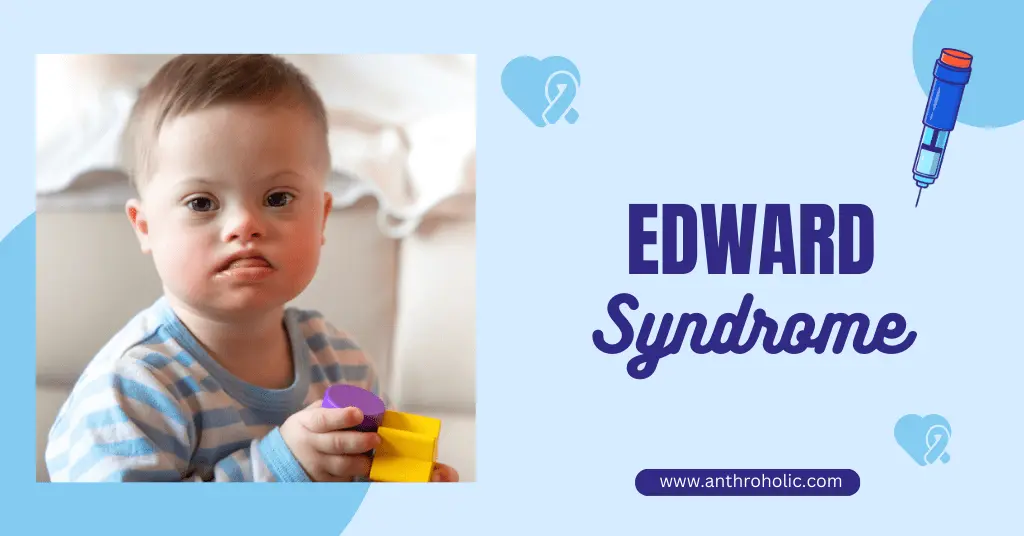Edward Bluemel Syndrome: Causes, Symptoms & Treatment
Is it possible for a single name to represent both artistic talent and a medical enigma? The name "Edward Bluemel" currently signifies both a rising star in the acting world and, unfortunately, a rare and challenging genetic disorder.
Edward Bluemel, the actor, born on May 22, 1993, is making his mark in the entertainment industry. A graduate of the Royal Welsh College of Music & Drama in 2015, his career has seen him appear in notable television shows, including "Killing Eve" and "A Discovery of Witches." This English actor is steadily gaining recognition for his performances, captivating audiences with his on-screen presence.
However, the name "Edward Bluemel" is also associated with a far more complex and less celebrated subject: a rare genetic condition known as Edward Bluemel Syndrome. This disorder, which is also referred to as Edwards Syndrome or Trisomy 18, presents significant physical and developmental hurdles for those affected.
| Edward Bluemel: A Profile | |
|---|---|
| Full Name: | Edward Robert Bluemel |
| Born: | May 22, 1993 |
| Nationality: | English |
| Education: | Royal Welsh College of Music & Drama (Graduated 2015) |
| Known For: | Acting in "Killing Eve," "A Discovery of Witches," and more. |
| Personal Fact: | In an interview, Edward revealed he has a third nipple. |
| Notable Roles: | Henry in The Commuter, Hugo in Killing Eve |
| Professional Information: | IMDB Profile |
The duality of the name raises questions about public awareness and understanding. While the actor Edward Bluemel builds his career, the medical condition demands attention. Understanding Edward Bluemel Syndrome, its origins, its impact, and its treatment options are crucial for medical professionals, researchers, and, most importantly, those affected by this challenging disorder and their families.
Edward Bluemel Syndrome, at its core, is a rare genetic disorder that affects individuals worldwide. It is fundamentally a consequence of chromosomal abnormalities, specifically the presence of an extra copy of chromosome 18. This genetic anomaly, known as trisomy 18, disrupts the typical process of development, leading to a cascade of health challenges that affect multiple organ systems.
The syndrome is characterized by a spectrum of physical and developmental difficulties. Infants born with Edward Bluemel Syndrome often exhibit distinctive physical features. These can include a small head (microcephaly), a small jaw (micrognathia), and a characteristic clenched fist with overlapping fingers. Other physical anomalies may affect the heart, kidneys, and other vital organs.
Developmentally, individuals with the syndrome often experience significant intellectual disabilities. Cognitive delays vary in severity, but most individuals require ongoing care and support throughout their lives. Seizures are also common, further complicating the medical picture and impacting the quality of life. The combination of these challenges underscores the complexity of the syndrome and the need for multidisciplinary care.
The medical community has shown growing interest in Edward Bluemel Syndrome, prompting considerable research into its genetic underpinnings. This research seeks to enhance diagnostic methods, comprehend the range of symptoms, and discover improved therapeutic interventions. Despite the challenges, advancements in medical care offer hope for those impacted by the syndrome and their families.
Individuals with Edward Bluemel Syndrome often face a wide array of health complications that significantly affect their quality of life. From the moment of birth, these children may grapple with severe health challenges. Cardiac defects, such as ventricular septal defects (VSDs) and atrial septal defects (ASDs), are common, requiring early intervention and specialized care. Respiratory issues, including apnea and difficulty breathing, also pose considerable challenges.
Gastrointestinal problems, such as feeding difficulties and structural abnormalities, may also be present. These complications can lead to growth delays and nutritional deficiencies, requiring the attention of pediatric specialists. The ongoing medical needs of individuals with Edward Bluemel Syndrome highlight the need for comprehensive, integrated healthcare.
The impact of Edward Bluemel Syndrome extends beyond physical health, significantly affecting the developmental trajectory of those affected. The intellectual disabilities associated with the syndrome vary in severity, but often result in delayed milestones. This requires early intervention to foster the individual's development and learning, with specialized education, physical therapy, and occupational therapy tailored to the individual's specific needs.
The emotional and psychological well-being of individuals with Edward Bluemel Syndrome is also a critical consideration. The challenges they face can impact their mental health, as well as their interactions with the world. Providing a nurturing and supportive environment, along with access to mental health services, is key to promoting their overall well-being.
The genetic origins of Edward Bluemel Syndrome are rooted in a chromosomal abnormality. The underlying cause is the presence of an extra copy of chromosome 18, resulting in trisomy 18. The majority of cases are due to a nondisjunction event during the formation of the egg or sperm cells. This means that the chromosome 18 fails to separate correctly during cell division, leading to a gamete with an extra copy of the chromosome.
In rare cases, the extra chromosome 18 may be present only in a portion of the body's cells, a condition known as mosaic trisomy 18. This mosaicism can lead to a milder presentation of the syndrome. The precise mechanisms that cause nondisjunction are still the subject of ongoing research. However, it is well-established that advanced maternal age is associated with an increased risk of having a child with trisomy 18.
While there are no known triggers for Edward Bluemel Syndrome, understanding the genetic origins helps in genetic counseling and prenatal diagnosis. Genetic testing, such as amniocentesis or chorionic villus sampling (CVS), can detect the presence of trisomy 18 during pregnancy. This allows for early planning and the possibility of informed decision-making by the parents.
The challenges in diagnosing Edward Bluemel Syndrome are primarily related to the wide variability in symptoms and the overlap with other genetic conditions. Diagnosis typically involves a combination of physical examination, imaging studies, and genetic testing. The physical anomalies, such as clenched fists and distinctive facial features, can raise suspicion of the syndrome in newborns.
Diagnostic imaging, such as ultrasounds, can reveal structural abnormalities in organs like the heart and kidneys. Genetic testing is essential for confirming the diagnosis. Chromosome analysis, or karyotyping, is the gold standard for detecting the extra copy of chromosome 18. Advanced techniques, such as fluorescence in situ hybridization (FISH) or chromosomal microarray analysis, may also be used to further refine the diagnosis.
Early and accurate diagnosis is crucial to providing appropriate medical care and offering support to families. Prenatal diagnosis through genetic testing allows for early intervention and preparation for the potential challenges that may arise after birth. Early intervention, including physical, occupational, and speech therapy, can positively impact the development of individuals with the syndrome.
The medical management of Edward Bluemel Syndrome is multifaceted and involves a team of specialists. There is currently no cure for the syndrome. The focus of medical care is to manage the various health complications that arise and provide supportive care to improve the quality of life. This may involve surgical interventions to correct cardiac defects or other structural abnormalities.
Respiratory support may be necessary to address breathing difficulties. Nutritional support is important, and often includes feeding tubes or specialized dietary interventions. Ongoing monitoring and treatment of seizures are also crucial. A coordinated, multidisciplinary approach is often the most effective way to provide comprehensive care to individuals with Edward Bluemel Syndrome.
The quality of life for individuals with Edward Bluemel Syndrome varies based on the severity of their symptoms and the availability of support systems. While the syndrome presents significant challenges, many individuals with Edward Bluemel Syndrome experience moments of joy and connection, as well as the love of their families. The availability of early intervention services, specialized therapies, and community support can positively impact the overall well-being.
Families who have children with Edward Bluemel Syndrome often face emotional, social, and financial burdens. Support groups, both online and in-person, offer a platform for these families to connect, share experiences, and access valuable resources. These support networks help navigate the challenges of caregiving and provide a sense of community. The support provided by friends, family, and professionals can make a profound difference.
Research in Edward Bluemel Syndrome is ongoing, with scientists seeking new treatment options and a deeper understanding of the genetic mechanisms. New technologies, such as genome editing, are being explored as potential therapeutic avenues. Understanding the molecular pathways disrupted by trisomy 18 is crucial for developing targeted therapies.
The future of Edward Bluemel Syndrome research holds promise for improving early diagnosis, refining medical management, and enhancing the quality of life for individuals affected by this condition. Advancements in genetic research, coupled with a continued dedication to improving care, provide optimism for a brighter future for those living with Edward Bluemel Syndrome and their families.
In the entertainment world, the actor Edward Bluemel is known for his talent and growing career. In the world of medicine, "Edward Bluemel Syndrome" represents a condition with a complex set of challenges. It is a rare genetic disorder that affects the development of the brain and other organs, and is characterized by intellectual disability, seizures, and distinctive facial features. Understanding these diverse realities is crucial.
Edward Bluemel Syndrome presents a unique set of symptoms that do not fully align with other known conditions, making it distinct in its presentation and challenges. The symptoms and health challenges are often quite different from those seen in Down Syndrome (Trisomy 21), for instance. The specific genetic and physical characteristics of Edwards Syndrome distinguish it from other genetic disorders that affect development.
The intersection of these two meanings of the name "Edward Bluemel" serves as a reminder of the diverse realities that exist. While the actor continues to create, the medical condition demands recognition, understanding, and ongoing support. As public awareness grows, it becomes even more critical to differentiate the name from the rare genetic disorder that shares it.



Detail Author:
- Name : Moises Abshire
- Username : schuster.jillian
- Email : fkohler@graham.com
- Birthdate : 1978-12-13
- Address : 2550 Dickens Flat Andreaneside, OH 06862
- Phone : 1-484-499-8494
- Company : Zemlak-Corwin
- Job : Transportation Worker
- Bio : Vel dolorum qui neque molestias quas. Vero iure aut mollitia ea eos. Tempore unde at tempora molestiae voluptas quam. Est tempore ipsa dolorem porro eligendi.
Socials
facebook:
- url : https://facebook.com/dax_rolfson
- username : dax_rolfson
- bio : Corrupti voluptatem id et illum et accusantium hic eius.
- followers : 268
- following : 2443
twitter:
- url : https://twitter.com/dax_rolfson
- username : dax_rolfson
- bio : Ab labore quia quia qui eos unde. Autem consequatur harum quia blanditiis placeat qui. Voluptatum non quo aut molestiae dolore sint.
- followers : 4852
- following : 1785
linkedin:
- url : https://linkedin.com/in/drolfson
- username : drolfson
- bio : Expedita quo eum exercitationem.
- followers : 5350
- following : 1220
tiktok:
- url : https://tiktok.com/@dax5873
- username : dax5873
- bio : Sunt rerum ipsum voluptatum illum itaque tempore. Vero impedit quas et nihil.
- followers : 5624
- following : 540